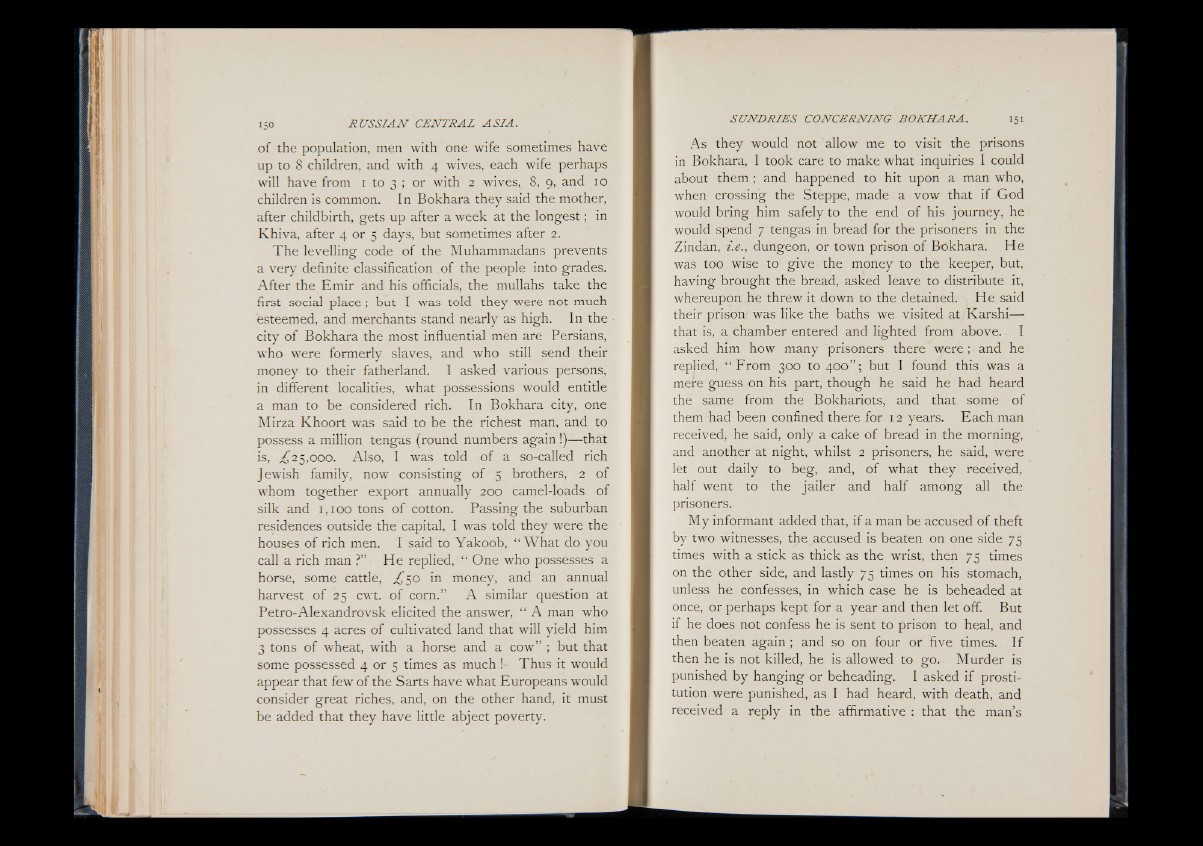
o f the population, men with one wife sometimes have
up to 8 children, and with 4 wives, each wife perhaps
will have from 1 to 3 ; or with 2 wives, 8, 9, and 10
children is common. In Bokhara they said the mother,
after childbirth, gets up after a week at the longest; in
Khiva, after 4 or 5 days, but sometimes after 2.
The levelling code of the Muhammadans prevents
a very definite classification of the people into grades.
After the Emir and his officials, the mullahs take the
first social p la c e ; but I was told they were not much
esteemed, and merchants stand nearly as high. In the
city o f Bokhara the most influential men are Persians,
who were formerly slaves, and who still send their
money to their fatherland. I asked various persons,
in different localities, what possessions would entitle
a man to be considered rich. In Bokhara city, one
Mirza Khoort was said to be the richest man, and to
possess a million tengas (round numbers again !)— that
is, £ 25,000. Also, I was told of a so-called rich
Jewish family, now consisting o f 5 brothers, 2 of
whom together export annually 200 camel-loads of
silk and 1,100 tons o f cotton. Passing the suburban
residences outside the capital, I was told they were the
houses o f rich men. I said to Yakoob, “ What do you
call a rich man ?” He replied, “ One who possesses a
horse, some cattle, £ 50 in money, and an annual
harvest o f 25 cwt. o f corn.” A similar question at
Petro-Alexandrovsk elicited the answer, “ A man who
possesses 4 acres of cultivated land that will yield him
3 tons o f wheat, with a horse and a cow” ; but that
some possessed 4 or 5 times as much !- Thus it would
appear that few o f the Sarts have what Europeans would
consider great riches, and, on the other hand, it must
be added that they have little abject poverty.
As they would not allow me to visit the prisons
in Bokhara, I took care to make what inquiries I could
about them | and happened to hit upon a man who,
when crossing the Steppe, made a vow that if God
would bring him safely to the end of his journey, he
would spend 7 tengas in bread for the prisoners in the
Zindan, i.e., dungeon, or town prison of Bokhara. He
was too wise to give the money to the keeper, but,
having brought the bread, asked leave to distribute it,
whereupon he threw it down to the detained. He said
their prison was like the baths we visited at Karshi—
that is, a chamber entered and lighted from above. I
asked him how many prisoners there w e re ; and he
replied, “ From 300 to 400” ; but I found this was a
mere guess on his part, though he said he had heard
the same from the Bokhariots, and that some of
them had been confined there for 12 years. Each man
received, he said, only a cake of bread in the morning,
and another at night, whilst 2 prisoners, he said, wrere
let out daily to beg, and, of what they received,
half went to the jailer and half among all the
prisoners.
My informant added that, if a man be accused of theft
by two witnesses, the accused is beaten on one side 75
times with a stick as thick as the wrist, then 75 times
on the other side, and lastly 75 times on his stomach,
unless he confesses, in which case he is beheaded at
once, or perhaps kept for a year and then let off. But
if he does not confess he is sent to prison to heal, and
then beaten again ; and so on four or five times. I f
then he is not killed, he is allowed to go. Murder is
punished by hanging or beheading. I asked if prostitution
were punished, as I had heard, with death, and
received a reply in the affirmative : that the man’s